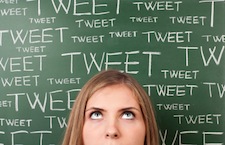
In the last year Twitter’s users have increased by a gob-smacking 56 per cent to (depending on who you believe) 175 million worldwide. Anyone who currently tweets will admit, once you start, sharing your life in 140 characters is compulsive – so far so obvious. But according to neurologist, Professor Gary Small, author of iBrain: Surviving the Technological Alteration of the Human Mind that’s the brain chemical dopamine at work. ‘Dopamine governs the reward system in the brain,’ he says. ‘It comes from the primitive part of the brain involved in any kind of addiction including cocaine.’ Each time you get someone mention, retweet, follow or friend you, your brain gets a little burst of reward – dopamine – that makes you want to post more and more. The same principle, says Professor Small, is behind you checking your email every few seconds for something interesting. ‘Take typical emails, FB posts or Tweets – nine out of ten are boring – but every tenth is interesting and gives you a quick buzz,’ he says. ‘That stimulates dopamine which fires up the brain’s seeking system, one of its strongest, primal urges to go back for more and more.’ Fascinating, non?
That over-sharing thing
Everyone knows that real-life wallflower who is a star in the Twittersphere. Researchers have found that shy, awkward people often become more socially adept through social media because they can refine and edit their profiles and how the world sees them, says Sherry Turkle, Professor of Social Studies of Science and technology at the University of Massachusetts and author of Alone Together: Why we expect more from technology and less from eachother. What is interesting about Turkle is that unlike other Twitter critics like Baroness Susan Greenfield who hardly use the medium, Turkle not only uses it she has written other books on the psychology of the net advocating it such as Life on the Screen: Identity in the Age of the Internet
Constantly refining and editing our profiles Turkle says, can cause the rest of us to feel a pang of anxious jealousy at other people’s seemingly perfect on-line lives, something Turkle has coined ‘Fear of Missing Out’ or FOMO. ‘It’s the increased anxiety resulting from constantly measuring ourselves against other people’s online lives,’ says Professor Turkle. ‘It’s a hyped up version of keeping up with the Jones’s; that feeling that other people are living better and more interesting lives than us. But it’s all performance. They’re editing out the vulnerabilities and weaknesses that real friendships expose. They’re not being themselves, they’re being their brand.’
‘High digital social media users are losing their face to face skills,’ says psychologist Dr Aric Sigman who published a paper called Well Connected in The Biologist claiming that for every hour spent online we lose 30 minutes in face to face contact with family and friends. ‘As a result, Britons spend just 50 minutes a day interacting socially with other people face-to-face and the number of people reporting they have no one to discuss important, deep issues with has tripled.’ Just yesterday, a drinking expert, Professor Jane McGregor at Nottinham University said that there is a theory going around public health circles about the rise in ‘preloading’ – that’s when you drink loads at home before going out – corresponding with the the rise in social media use and some researchers believe it’s because we all have so much more anxiety about the idea of facing one another in living, breathing forms that we need to get that little bit tipsy to handle it.
But then there is – perversely – this massive rise in over-sharing on line (am I wrong?). Think of those car-crash chronicles of friends’ breakdowns and divorces via long, stream-of-consciousness Facebook feeds posted at 3am (or is this just my friends?). When I put this to Aric Sigman he said it’s because people now expect more support and connection from the on line world than it can ever possibly provide. ‘That trivializes serious experiences and can lead to more isolation and anger because people need real warmth and face to face support not ‘likes’, he explains. ‘When we see eachother and hug our friends, bonding chemicals such as oxytocin are produced that make us feel good,’ he says. It’s why your whole body feels like it’s smiling (despite a hangover) after a real-life – not virtual – night out with friends. ‘People with more face to face social contact have stronger immune systems and live longer than others.’
Like this article? Sign up to our newsletter to get more articles like this delivered straight to your inbox.




















































